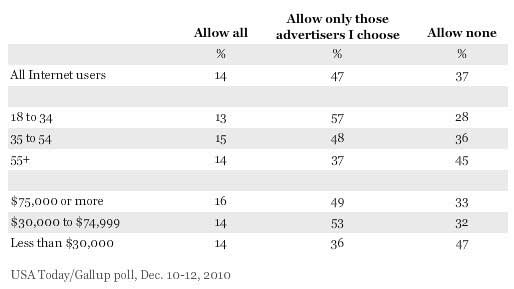Most online adults (61%) say they're aware advertisers use their online browsing history to target ads to them, and roughly two-thirds (67%) say they are opposed to such tactics, even if those tactics help keep Web content free, according to a survey from Gallup and USA Today.
Younger Internet users (age 18-34) are more likely to approve of advertisers delivering behaviorally targeted ads to them (34%) and say free Web content is worth any such invasion of privacy (40%).
![]()
Similarly, affluent online adults (annual incomes of $75,000+) are also more likely to approve of such ads (35%), despite any invasion of privacy (40%).
Many Americans, however, are amenable to being tracked by advertisers they choose: 57% of online adults age 18-34 and 49% of those earning $75,000+ annually say they would allow advertisers of their choosing to target ads to them.

Looking for great digital marketing data? MarketingProfs reviewed hundreds of research sources to create our most recent Digital Marketing Factbook (May 2010), a 296-page compilation of data and 254 charts, covering email marketing, social media, search engine marketing, e-commerce, and mobile marketing. Also check out The State of Social Media Marketing, a 240-page original research report from MarketingProfs.
In December 2010, the US Federal Trade Commission proposed a policy framework designed to balance consumers' privacy interests with those of digital advertisers. The framework suggests a "Do Not Track" mechanism—likely a setting on users' browsers—enabling consumers the choice of whether to allow the collection of data regarding their online searching and browsing activities.
About the data: Results for this USA Today/Gallup poll are based on telephone interviews conducted December 10-12, 2010, with a random sample of 1,019 adults age 18+, living in the continental US.



